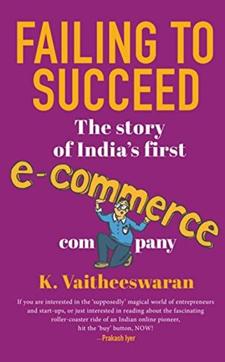Review: Failing to Succeed by K Vaitheeswaran
An e-commerce pioneer writes an honest book about his career

Few Indian entrepreneurs have the guts to describe personal failure in detail. K Vaitheeswaran, remembered by IT sector early birds as a pioneer whose significant launches included India’s first online marketplace (Fabmail.com born 1999), PIN-based payment gateway, e-wallet and Cash on Delivery (COD) among much else, bravely spills all the beans in this extraordinary book.
The author strips off every corporate veil, his own as well as others’, in a poignant narration of his business career that unfolds like a Greek tragedy. “This is not a work of fiction. Any resemblances to people, places and incidents are not coincidental... All characters are real and events in this book did take place. If you are able to recognise some people, places and companies, you must be right. I have no interest in any of the companies or their competitors mentioned here,” he states.
When Vaitheeswaran qualified as an electronics engineer from IIT-Kharagpur he had no wish to do something on his own. “I noticed an ad in The Hindu from a company I had never heard of, Wipro Information Technology Limited, and got selected as product engineer.” After 10 years at Wipro (1989-1998) IT was still in its infancy in India. When a colleague suggested using email instead of making phone calls, Vaitheeswaran asked, “What’s an email?” and took a hotmail.com id because it was free. “I was fascinated by Internet and instinctively knew it would change our lives.” It did. He noticed an online ad on a website called Amazon.com urging browsers to click and buy books. That click, he says, changed his life. He was a ready admirer of the “brilliant business called e-commerce.”
Thoroughly demoralised with Wipro when he intentionally bunked office for two days and was horrified that nobody had noticed his unexplained absence he decided to quit and move into e-commerce. “I looked around but couldn’t find any online shop. So I founded India’s first e-commerce company.” He did so along with five professional acquaintances. None had money so their top priority was to get some, a tough call.
In April 1999 Reliance was looking to invest in start-ups. A meeting was sought. To the applicants’ surprise Mukesh Ambani was present along with Reliance team members. Embarrassingly the laptop crashed and it was goodbye to carefully prepared slides. After a while Ambani excused himself. “We knew we had botched up the opportunity,” recalls Vaitheeswaran. Not so. While the nervous group was waiting for the lift, a gentleman asked them to whom the investment cheque should be addressed! “We signed a simple agreement with Reliance Industries and got going with our dreams.”
Fabmail’s first big decision was to offer books and music. Signing up music labels, getting content from publishers, conducting “stalking surveys” to nab likely customers, partnering Citibank for the world’s first – “yes, that’s right, the world’s first” – PIN-based payment gateway, getting to B2C began well but being first-mover had serious disadvantages when only three million people had Internet access in India. Growing up pangs were immense. On 10th March 2000, dotcom valuations peaked creating countless millionaires on paper. The dotcom bust came on 14 April. Newbies groaned for survival, Fabmail included.
Read more: Indiaplaza.com: How an Indian e-commerce firm ran out of cash
Over three chapters, Vaitheeswaran analyses two conundrums: profitability vs profits and growth vs profits. Fabmail metamorphosed into Indiaplaza; the bitter struggle for funding is described in detail. There was a disastrous cleavage in the board and Vaitheeswaran lost the power game. COO, he says bitterly, meant Chief Obedient Officer. “The entire world collapsed around me. I was being sacked from my own company.” Funding dried up, Reliance included and a paupered Vaitheeswaran was on the brink of a nightmarish nervous collapse.
In anguish, Vaitheeswaran, the failed entrepreneur, decided to turn coroner and perform an autopsy of his dead company. This book is his corporate postmortem report, a rare publication.
Sujoy Gupta is business historian and corporate biographer






